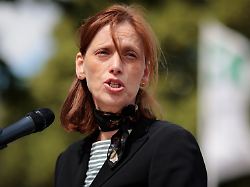Talk to Markus Lanz
Prien: CDU “alternative for federal government”
By Marco Schlichting
08/25/2023, 04:40 am
While the traffic light is in constant dispute, things are not really peaceful in the Union either. A few weeks ago, CDU leader Merz made contradictory statements about his party’s cooperation with the AfD. In the ZDF talk show Markus Lanz, the guests also talk about it.
It was a bit of a shock: In a summer talk on ZDF, CDU leader Friedrich Merz does not rule out cooperation with the AfD – at the municipal level. Criticism poured in immediately, including from the Union. After twelve hours, Merz rowed back on Twitter. But what does it really look like now? Could the Union work with the AfD? For the CSU, party leader Markus Söder has categorically ruled this out. At a press conference, a journalist then asked whether that would also apply if there were an AfD district administrator in Bavaria, as in Thuringia. That is impossible in the Free State, so Söder. However, by the end of 2024, the AfD could at least get into the runoff elections in up to forty cities or municipalities in the elections for mayors or district administrators. Also in the eastern Bavarian district of Regen, where a new district administrator will be elected in October.
The deputy CDU chairwoman Karin Prien analyzes the current situation in Germany and people are unsettled. She accuses the federal government on Thursday evening on the ZDF talk show Markus Lanz: “Politics takes care of lots of topics that are totally uninteresting. Gender or self-determination law – you can talk about it, there are reasons for that, but people are interested in it zero. We are conducting a socio-political debate that completely ignores the people. And we have a policy that no longer provides evidence that it really solves the major problems of our country.” This is a very dangerous mixture, says Prien.
“Merz does not notice the pain”
Merz described the Union as an “alternative for Germany with substance”. By that he meant an alternative to the federal government, explains Prien. “We are an alternative for Germany for the next federal government,” adds the CDU politician. And further: “I didn’t find Merz’s sentence wise, but to assume that he wanted to propagate a proximity to the AfD is absurd.”
The journalist and political expert from the editorial network Germany (RND), Kristina Dunz, sees it differently. “In my view, the CDU shouldn’t formulate something like ‘an alternative for Germany with substance.’ However, it is correct that Merz did not ingratiate himself with the AfD, but with their voters. In addition, after the election of an AfD district administrator in Sonneberg, Merz declared the Greens the main enemy of the Union. That was very unfortunate. Several CDU politicians had told her that Merz was completely unsuspected of wanting to coalition with the AfD. “But he puts his right hand on the hot stove and doesn’t notice the pain.”
Exposing AfD content
Prien explains the future tasks in dealing with the AfD quite clearly: “You have to expose the content of the AfD’s offers, but you also have to address the things that really burden people. These are high energy prices, inflation, fear of decline.”
The CDU is also leading these discussions with a lot of populism, Dunz criticizes – and cites as an example the demand by the CDU’s first parliamentary manager, Thorsten Frei, to abolish the individual right to asylum. “This demand could just as easily have come from the AfD.” In order to implement them, the Union would need a two-thirds majority in the Bundestag, which it would never get together. “People like it this way: They first make a ruckus, and then nothing happens. That’s the worst way to deal with the migration issue, to get into an AfD speech, but then not deliver a real solution,” says Dunz.
Quite infantile
As far as future possible cooperation between the Union and the other democratic parties with the AfD at the local level is concerned, Dunz and Prien have two different approaches. Dunz demands that the Union can initiate projects with the AfD, such as the construction of a daycare center at the municipal level, but must always point out the undemocratic demands of the party on a large scale. Prien has another idea: “You have to find pragmatic solutions on the spot so that people in the district concerned can continue to live sensibly.” One possibility could be that the democratic parties slightly modify an AfD application and then decide on their variant.
In reality, however, it will not work that way. The AfD recently published an eight-week-old motion by the Union parties verbatim in the Bundestag. The Union parties rejected him – because he came from the AfD. That may seem very infantile, but it also shows that more professional concepts are needed when dealing with the AfD.
